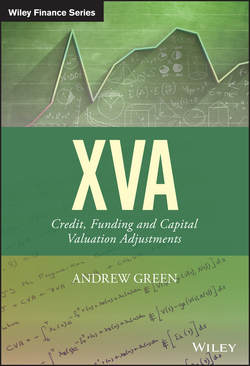Читать книгу XVA - Green Andrew - Страница 28
На сайте Литреса книга снята с продажи.
PART One
CVA and DVA: Counterparty Credit Risk and Credit Valuation Adjustment
CHAPTER 2
Introducing Counterparty Risk
2.4 Credit Risk Mitigants
2.4.5 Break Clauses
ОглавлениеMany OTC derivative contracts contain one or more break clauses that provide for the early termination of a derivative contract. There are two types of break clause, mandatory and optional. A mandatory break clause terminates the trade prior to the natural maturity date, with the remaining value of the derivative settled by a cash payment. So, for example, a twenty-year interest rate swap with a mandatory break clause after five years will terminate five years after the start of the transaction with the mark-to-market value of the remaining fifteen years of the transaction paid in cash on the appropriate settlement date immediately after the mandatory break date. Ignoring credit risk, funding costs and capital considerations, the value of the two trades with and without the break clause will be the same. However, the expected exposure of the trade with a mandatory break is terminated after five years and hence the credit risk and CVA are much lower. In practice, trades with mandatory break clauses reduce the initial cost of the derivative for the counterparty and the trades are often restructured just prior to the break date. Figure 2.4 illustrates a swap with a break clause half way through the underlying term.
Figure 2.4 A swap with and without a break clause and the associated expected positive exposure profile. For the swap with the break clause, the CVA is lower.
Optional break clauses give the option to one or both counterparties to terminate the derivative on one or more dates prior to the natural maturity of the trade. Settlement then proceeds in the same way as a mandatory break clause, with a cash settlement of the mark-to-market of the remaining trade. In practice, optional break clauses have been rarely, if ever, exercised irrespective of any considerations of optimal exercise. The argument has been that exercising the break clause would ruin the relationship with the client. Internally within banks the right to exercise the credit break has often sat with client relationship management who have had few incentives to use the breaks.20 However, many derivative dealers are now arguing that optional break clauses should now be exercised and actively used as a credit mitigant (Cameron, 2012).
20
Optional breaks are often colloquially referred to as mutual breaks because of the bilateral nature of the option to break in most cases.
